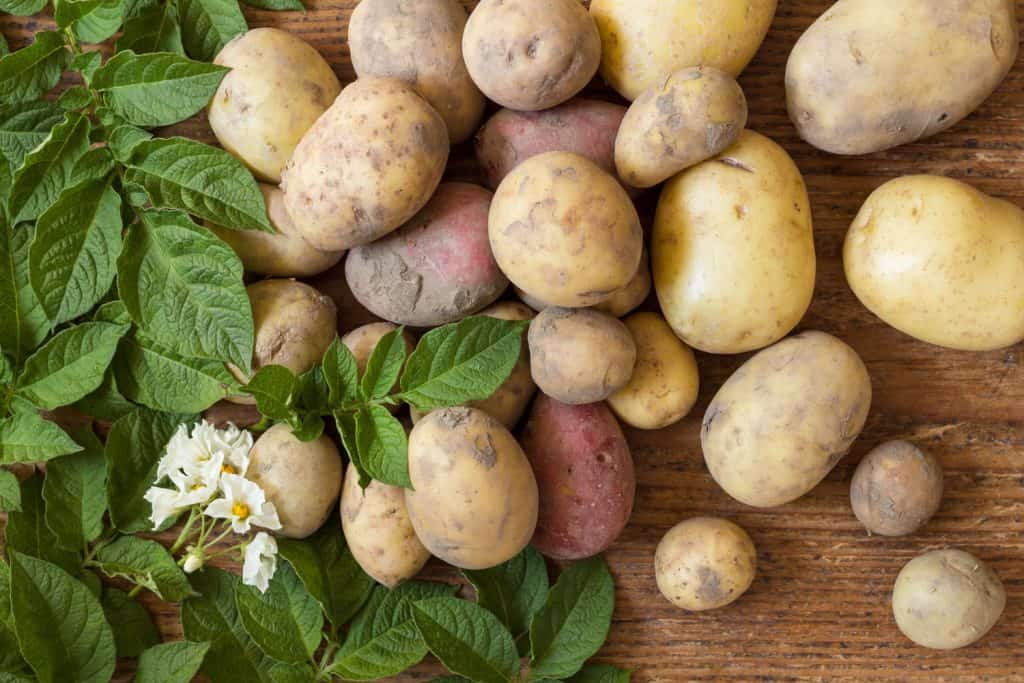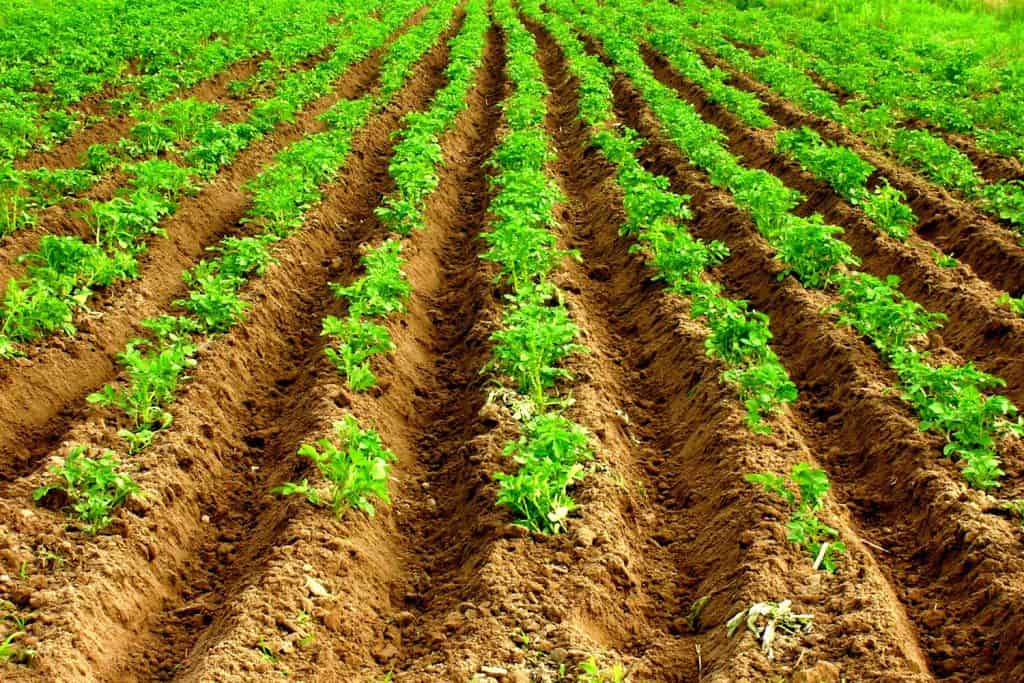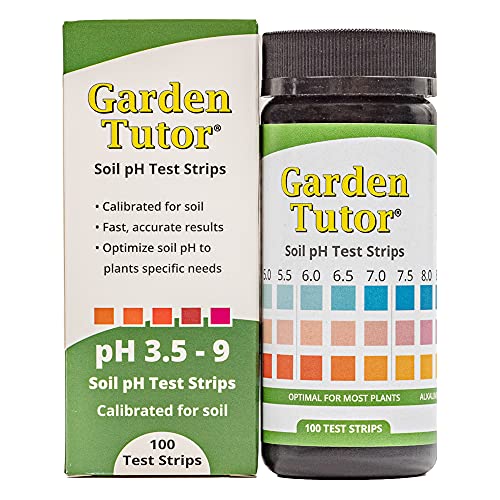If you plan to grow your own potatoes at home, you'll need fertilizer to provide them with the proper nutrients to flourish. Wondering which fertilizers are best for home-grown potatoes? Well, look no further. For this post, we have researched the potato plant's nutrient requirements and some of the best fertilizer options on the market today.
The ideal fertilizer ratio for potato plants typically has twice the amount of potassium and phosphorus than it does nitrogen. All-purpose fertilizers that have equal amounts of all three nutrients will suffice as well. When young potatoes are first developing, the nitrogen levels should be low to prevent the potato from becoming susceptible to diseases. However, as the potato grows bigger, more nitrogen will be needed.
Here are eight fertilizers to consider for your potato plants:
- Jobe’s Organics 09526 Organic All Purpose Granular Fertilizer
- Espoma GardenTone Plant Food, Natural & Organic
- Joyful Dirt Fertilizer
- Southern Ag All Purpose Granular Fertilizer
- Urban Farmer Organic Potato Fertilizer
- Miracle-Gro Performance Organics Edibles Plant
- Scotts All-Purpose Flower and Vegetable Plant Food
-
IV Organic All-Purpose Fertilizer
The amount of fertilizer that you add to your potato plants before and during their growth period will largely depend on the number of potatoes you have already planted. Continue reading to learn more about potato plant fertilizers and how to provide your plants with their needed nutrient requirements.
8 Best Fertilizers For Potatoes

Potato plants need a high amount of phosphorus to thrive. Not only does the phosphorus help the potatoes to develop size and strong roots, but it helps to use other nutrients effectively. Potassium helps potatoes regulate root growth and makes them less susceptible to common plant diseases and pests.
Being that potatoes are a root plant, a high amount of nitrogen is not needed as much as it would be in a leafy green plant. However, some nitrogen is required for the plants to grow. Let's take a look at some of the best potato fertilizers available today.
1. Jobe’s Organics Organic All Purpose Granular Fertilizer
This popular fertilizer from Jobe's is biodegradable and made without any synthetic chemicals or dyes. You can use this on your potato plants to provide them with protection from plant diseases and other unfavorable conditions. The fertilizer contains a healthy amount of Mycorrhizal fungi and Archaea bacteria to promote optimal root growth for your potato plants and improve their soil quality.
Take a look at this fertilizer on Amazon.
2. Espoma GardenTone Plant Food, Natural & Organic
Espoma Garden is a well-known brand in the horticulture industry, and this wonderful blend of organic soil compounds is a good example of why. Developed by and for professional gardeners, this fertilizer contains 15 essential nutrients for optimal plant growth and promote a balanced feeding schedule. It contains no toxic or hazardous ingredients and is safe to use on young and mature potato plants.
Read more about this fertilizer on Amazon.
3. Joyful Dirt Fertilizer
Here's another quality fertilizer that you can use for your potato plants. The Joyful Dirt fertilizer is also all-natural and contains only organic ingredients. This plant food is slow-releasing and includes an exclusive blend of bio-tone microbes, promoting healthy soil and solid root growth.
Take a look at this fertilizer on Amazon.
4. Southern Ag All Purpose Granular Fertilizer
If you are looking for a simple all-purpose fertilizer that will keep your potato plants as healthy as possible, consider this blend by Southern Ag. This granular feed fertilizer will provide your potato plants with vital nutrients for a bigger, healthier harvest. It's specially formulated for growing vegetables, tomatoes, herbs, and fruit.
Learn more about this Southern Ag fertilizer on Amazon.
5. Urban Farmer Organic Potato Fertilizer
Here is another excellent organic fertilizer for your potato plants. It comes in a 3-pound bag and can feed up to 30 potato plants for the entire season. This GMO-free organic fertilizer contains sulfate, blood meal, gypsum, and fishbone meal, amongst several other essential nutrients and vitamins to keep your potato plants healthy and disease-free.
Read more about the Urban Farmer fertilizer on Amazon.
6. Miracle-Gro Performance Organics Edibles Plant
This all-purpose plant feed by Miracle-Gro is another great fertilizer for your potato plants. You can feed your plants for up to 3 months, and it contains nothing but all-natural ingredients. The microbes in this feed breakdown natural ingredients into smaller nutrients to help support strong root development and improve water efficiency.
Check out the Miracle-Gro fertilizer on Amazon.
7. Scotts All-Purpose Flower and Vegetable Plant Food
This continued-release plant food by Scotts is another great all-purpose plant food for your favorite plants. This 3-pound bag of fertilizer is enough to keep your plants adequately fed for up to two months. The formula is safe, so you don't have to worry about nutrient burn, as long as you use it as directed. If you're looking for a simple formula that can deliver quality vitamins and nourishment to your potato plants, here is one that will do it.
Find more details about Scott's All-Purpose plant food on Amazon.
8. IV Organic All-Purpose Fertilizer
This fertilizer may not be as popular as the others, but it's worth considering if you prefer something organic. It works wonderfully for potato plants of all stages. This fertilizer contains all the nutrients growing plants need to stay healthy and strong. It can help improve nutrient-deficient soil and stimulate cellular growth. This versatile product can be used for up to 3 months in granular form.
Find out more about it on Amazon.
How often should you fertilize potato plants?

Most gardening experts recommend fertilizing potato plants no later than two weeks after their initial planting. This is due to the young potato plants needing phosphorus and potassium to grow larger and absorb water. After the initial fertilizer treatment, it's best to continue fertilizer application every four weeks.
They also recommend that you stop fertilizer treatments two weeks before the harvest. When using granular fertilizer, always thoroughly water the soil to ensure that the fertilizer is absorbed into the soil when you fertilize your potato plants.
Can you overfertilize potatoes?
No. It is generally not a good idea to over-fertilize potato plants, as they can become deformed and over-developed due to stress. If you over-fertilize your potato plants, you may notice that the leaves appear rolled up or pale compared to their typical green hue. The easiest way to prevent over-fertilization or under-fertilization is to check the soil's nutrient levels regularly.
Take a look at this pH testing kit on Amazon.
Why are my homegrown potatoes so small?
If your potatoes are growing smaller than average, the chances are that there is a nutrient deficiency. This can often be due to improper watering, sunlight, too little or too much fertilizer, or too-high temperatures. Harvesting your potato plants too early can also be the reason for their small size. To rectify the issue, you'll need to troubleshoot every step of your growing process, particularly the soil pH and sunlight levels.
Is Epsom salt good for potatoes?
Yes, Epsom salt can be helpful when added to the soil of potato plants. It provides the plants with a good boost of magnesium, which is beneficial in stimulating biochemical reactions. It also helps to build strong cell walls and supports the growth process.
If you plan to add Epsom salt to your potato plants' soil, be sure not to add more than half a cup to every gallon of water. This will prevent you from accidentally drying out the soil when watering the plants.
Check out this Epsom Salt on Amazon.
Is cow manure good for potatoes?
Manure can be an excellent source of nutrition for potato plants. It can also lighten the soil and provide excellent moisture retention. However, the manure shouldn't be fresh when applying it to the compost. Be sure that the manure has been cured for a few months or heated up in compost to at least 150 degrees Fahrenheit before applied to a potato plant.
If not, the harmful pathogens and bacteria in the manure can quickly kill the potato plants and cause them to develop scabs. If you've added manure to your compost, it's best to apply it to the soil before adding your potato plants.
Check out this pre-composted manure on Amazon.
Wrapping Things Up
We hope that this post has provided you with enough fertilizer options for your potato plants. The most important thing to remember when planting potatoes is to regularly test the soil's pH levels to ensure that they have everything they need for sustained growth.
Before you go, be sure to check out our other posts:











